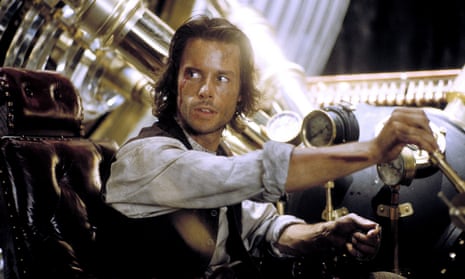At some point in the 1980s, mainstream culture gave up on the future. Now, all we get are dystopias, environmental catastrophes or zombie apocalypses. In Cormac McCarthy’s The Road or Robert Kirkman and Tony Moore’s The Walking Dead, there is no need even to explain the reason for civilisation’s downfall. The coming collapse has been so thoroughly internalised that it no longer needs to be justified. The closest recent mainstream attempt at imagining a utopia is in Iain M Banks’s Culture novels, but Banks’s post-scarcity society is alien and not the future of mankind.
What would HG Wells, who died 70 years ago and was born 150 years ago next month, make of all this? His first novel, The Time Machine, was published in 1895, and he saw the coming century clearer than anyone else. He anticipated wars in the air, the sexual revolution, motorised transport causing the growth of suburbs and a proto-Wikipedia he called the “world brain”. He foresaw world wars creating a federalised Europe. Britain, he thought, would not fit comfortably in this New Europe and would identify more with the US and other English-speaking countries. In his novel The World Set Free, he imagined an “atomic bomb” of terrifying power that would be dropped from aeroplanes. This was an extraordinary insight for an author writing in 1913, and it made a deep impression on Winston Churchill.
For Wells, imagining a viable version of the future was an intellectual game. It was a chance to show off, and a seemingly respectable way to be deeply subversive. Writing to his friend Elizabeth Healy, he described Anticipations, his 1901 book of predictions, as “designed to undermine and destroy the monarch, monogamy, faith in God and respectability – and the British empire, all under the guise of a speculation about motor cars and electric heating”. Futurology, for Wells, was exhilarating. The idea that writers would give up even trying was so implausible that Wells never imagined it.
The sudden disappearance of worthwhile futures from our culture coincided with the rise in our understanding of climate change. Global warming indeed appears inevitable and apocalyptic, but is this reason enough to remove all hope from our visions of the future? Rising sea levels, the need to decarbonise the economy, and chaotic shifts in ecosystems are all difficult problems to engage with, but we are a species that lived through the Black Death, the Somme and the threat of global thermonuclear war. It seems odd that we would give up now.
I suspect the real problem is as much a rejection of originality as it is a reaction to climate change. In a hypermediated age where we are constantly engaged in filtering out the irrelevant, the last thing we want is to tackle the genuinely new.
But originality was Wells’s calling card. In a six-year stretch from 1895 to 1901, he produced a stream of what he called “scientific romance” novels, which included The Time Machine, The Island of Doctor Moreau, The Invisible Man, The War of the Worlds and The First Men in the Moon. This was a dazzling display of new thought, endlessly copied since. Unfortunately, Wells wanted to be taken seriously. Scientific romances were hardly respectable, so he moved into more established literary forms. While some of his later novels such as Kipps (1905) and Tono-Bungay (1909) have their admirers, the majority are now all but forgotten. A book like The War of the Worlds, in contrast, inspired every one of the thousands of alien invasion stories that followed. It burned its way into the psyche of mankind and changed us all forever.
Wells’s genius was his ability to create a stream of brand new, wholly original stories out of thin air. It is not those specific stories that we need now, but the imagination that spawned them. It is hard to find a contemporary author producing stories as new and unprecedented as Wells’s early work, but we should try. Because if it is true that you have to imagine a future before you can build it, then this failure of our imagination is deeply alarming.
